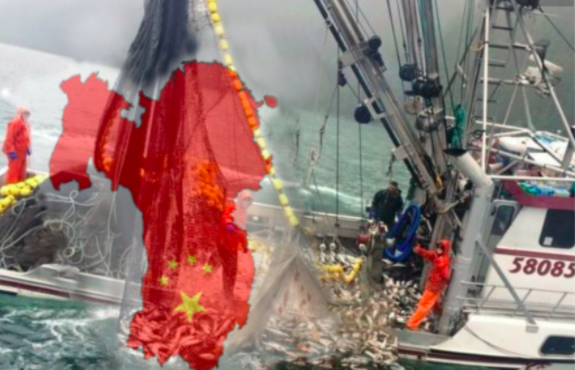THIS TIME, TRADE-SECRET WARS HIT ALASKA FISHING FLEET
Just as the Alaska commercial salmon fishing season is getting underway, China has retaliated against a new U.S. tariff schedule by slapping tariff increases on 545 products from the United States, including red salmon, other salmon, and halibut.
Dozens of other seafood products, such as lobster, tuna, shrimp, and prawns, also got caught in the China tariff net.
A previous skirmish in the tariff war that started during the winter did not include Alaska seafood products, but this time they are on the list — just when salmon will be coming out of the water.
The tariffs will go into effect on July 6 and will mean an additional 25 percent tax on top of current tariffs.
John Connelly, president of the National Fisheries Institute, said his group is reviewing the announcement.
“We are deeply disappointed in these retaliatory tariffs. There is no connection between the products targeted by the U.S. and the tariffs Beijing plans to impose on exported American seafood. It is Maine lobstermen, the men and women on boats in Alaska and families harvesting and processing seafood in the Pacific Northwest who will feel the brunt of the Administration’s misguided policy. It is not clear where these trade actions will ultimately lead, what is clear is that they will negatively impact American seafood jobs,” he said in a statement.
Although free markets tend to adjust, the tariff could have an impact and make supply chains less efficient for an unknown period of time. Major seafood processors such as Trident, Peter Pan, North Pacific and Alaska General will likely have their tariff experts working through the weekend to try to determine the effect of China’s actions, not only on the products that are sold for domestic consumption in China, but in the massive secondary processing industry that China has. A tariff could boomerang on China, impacting its fish processing workforce, as well.
The news creates uncertainty for the U.S. commercial fishing fleet and could have a deleterious effect on the pink salmon market, since those fish are cheap and abundant, but require processing to be commercially viable.
China is Alaska’s largest seafood export market. By tonnage, exports to China account for more than 35 percent of Alaska’s seafood catch. The export value is at least 27 percent. China overtook Japan as Alaska’s top destination a few years ago.
But, while China is very important as a market for Alaska, the nation brings in most of its salmon from Norway and Chile. Last year, China imported 40,000 tons of salmon.
The Alaska exports to China are usually sent as headed and gutted salmon, which are then processed using cheap labor and exported to other markets, with Europe, the United States, and Japan being the largest. The processing involves a lot of removal of tiny pin bones, a labor-intensive process that would make salmon more expensive if done stateside.
Industry leaders that Must Read Alaska spoke to over the weekend were unsure if the tariffs would apply to the fish that was being processed and simply re-exported from China. That is a question being sorted out by the experts.
TARIFFS – NEED TO REBALANCE?
Tariffs are always a top concern for exporters. The latest tariff increases by China on U.S. products include everything from cat food to whiskey.
But the move was long expected. Trade fairness initiatives began earlier this year when the White House asked the U.S. Trade Representative to develop a list of Chinese products to be targeted with tariff increases due to China’s unrepentant technology pirating practices.
“China’s government is aggressively working to undermine America’s high-tech industries and our economic leadership through unfair trade practices and industrial policies like ‘Made in China 2025,’” U.S. Trade Representative Robert Lighthizer said in a statement.
Many U.S. producers have long felt that the scale was tipped in favor of other countries, even in such sectors as seafood.
For instance, last week the American Scallop Association wrote to Commerce Secretary Wilbur Ross and asked for changes to the Canada-European Union Comprehensive Economic and Trade Agreement, which the groups says puts the U.S. scallop and lobster exporters at an 8-percent disadvantage against their Canadian competitors.
The group wants the Trump Administration to renegotiate terms with EU members that give U.S. products the same tariffs as Canadian products.
President Trump started the tariff war because China has been stealing technology and intellectual property for years.
“President Trump starts a lot of his negotiations by dropping a figurative atomic bomb, and that gets the conversation started,” said Alaska State Sen. Peter Micciche, a commercial fisherman as well as a policy maker. “As a fisherman, the margins are tight, so that 25 percent eliminates many product lines from consideration globally. As a policy maker, I’ve seen this volley going back and forth, and it’s the way Trump is having a conversation with them. But for some of us, it hits this close to home, and I can understand why people cringe in other industries.”
HIGH STAKES ON THE HIGH SEAS
While China and the U.S. are in the middle of a “conversation,” China is quietly building salmon farms in the Yellow Sea. A Chinese company, Shandong Wanzefeng Fishery, took delivery of a massive net cage last week. It’s the largest of its kind in the world, and it will be placed about 130 miles east of Rizhao, where the company believes the water is cold enough to rear salmon. The company plans to harvest 1,500 tons of salmon per year when operational. More will be added as the process is refined.
